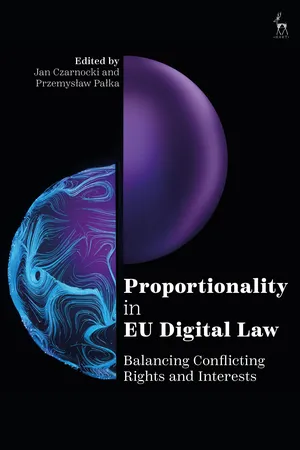
Proportionality in EU Digital Law
Balancing Conflicting Rights and Interests
- 312 pages
- English
- ePUB (mobile friendly)
- Available on iOS & Android
Proportionality in EU Digital Law
Balancing Conflicting Rights and Interests
About this book
This book addresses the interplay between the proportionality principle and EU digital law. Does EU digital law provide a fair balance of rights and interests? How does proportionality limit legislation in the digital economy? How can it be used to balance competing rights and interests? Diving into the dialectics of law and technology, the book analyses the relevance of the proportionality principle in regulating the digital world and as a vital tool for balancing competing rights and interests. The chapters analyse how conflicting rights and interests are resolved in EU digital law through the proportionality principle and critically reflect on its application. They scrutinise recent EU regulatory initiatives such as the GDPR, AI Act, Copyright Directive, DSA, and more. They reflect on the unique context of AI systems regulation, digital marketing, and data protection, illuminating the application and impact of proportionality in these arenas. Providing an in-depth examination of legal actors and real-life conflicts resolved by applying EU digital law, the book explains the pivotal role of the principle of proportionality in achieving an optimal balance of rights in our digital era.
Frequently asked questions
- Essential is ideal for learners and professionals who enjoy exploring a wide range of subjects. Access the Essential Library with 800,000+ trusted titles and best-sellers across business, personal growth, and the humanities. Includes unlimited reading time and Standard Read Aloud voice.
- Complete: Perfect for advanced learners and researchers needing full, unrestricted access. Unlock 1.4M+ books across hundreds of subjects, including academic and specialized titles. The Complete Plan also includes advanced features like Premium Read Aloud and Research Assistant.
Please note we cannot support devices running on iOS 13 and Android 7 or earlier. Learn more about using the app.
Information
Table of contents
- Cover
- Title Page
- Foreword
- Contents
- List of Contributors
- Table of Cases
- Table of Legislation
- 1. Introduction
- 2. The Origins of Proportionality and Balancing in the Jurisprudence of the European Court of Human Rights
- 3. Proportionality in Modern Regulatory States Confused about Priorities. Judges Like, but do not Comply with Academic Doctrines
- 4. Proportionality of Goals or Means? The Politics of Data Governance in the Shade of Constitutional Norms
- 5. Between Rights, Interests and Risk – The Role of Proportionality Balancing in EU Digital Law
- 6. Proportionality in the Proposed Artificial Intelligence Liability Directive and the Revised Product Liability Directive
- 7. The Principle of Proportionality in Relations between Users and Providers of Digital Services
- 8. Regulating AdTech: Chasing Chimeras or the Art of the Possible?
- 9. The Data Act and the Balance of Interests between Device Purchasers and Manufacturers
- 10. A Balancing Exercise: Applying the Principle of Proportionality to Determine the Effect of Withdrawal of Consent for Processing Personal Data in Biomedical Research
- 11. Proportionality and Civil Law Policy in Copyright: Criticism of Necessity Standard as Applied in CJEU Case Poland v Parliament and Council (C-401/19)
- 12. EU Digital COVID Certificate Regulation: A Retrospective Analysis on Proportionality and Data Protection
- 13. Is Prohibiting Targeted Ads for Minors under the Digital Services Act Proportionate? The Need for a Child-rights-based Approach to Protecting Children’s Personal Data Online
- Index
- Copyright Page